Implementing Access to and Benefit-sharing of Genetic Resources (ABS)
Under the Convention on Biological Diversity
- JBA's 15-year Experiences - *
Summary:
- Participating countries: Thailand, Indonesia, Malaysia and Japan
- Activities: joint research and capacity building in the partner countries, and invitations for technical training or joint research in Japan
- A total of 591 researchers of the four countries participated in the three bilateral projects.
- Total budget provided from Japan's side: approximately JP\1 billion (ca. US$ 10 million)
2. Promoting the Establishment of a National 'Biological Resources Center (BRC)' for Microorganisms (1999 - 2002)
- In 1999, JBA recommended to the Ministry of International Trade and Industry (it was renamed in January, 2001 as the Ministry of Economy, Trade and Industry (METI)) that a national core BRC for microorganisms, adapted for the age of the CBD, should be created in Japan.
- In 1999, JBA provided support to prepare for the "OECD Workshop Tokyo '99 on Scientific and Technological Infrastructure - Support for BRCs", hosted by the Japanese government.
- In 2000 and 2001, JBA participated as a key member in the OECD Task Force on BRC, and contributed to the publication of OECD Policy Guidance on BRC in 2001.
- In April 2002, Japan's BRC for industrial microorganisms (NITE-BRC) was established within National Institute of Technology and Evaluation (NITE) with the construction cost of approximately JP\6 billion.
- JBA continuously supported NITE-BRC in developing an international research cooperation system with other countries in compliance with the CBD.
3. Promoting Access to and Benefit-sharing of Genetic Resources in Compliance with the CBD (2002 - Present)
- Participation in the Conference of the Parties to the CBD (COP) and related meetings on Access and Benefit-sharing (ABS).
- Dissemination of the CBD and the Bonn Guidelines for public education in Japan
- Development of 'Japan's ABS Guidelines for Users'
- Specialized website on ABS: a guide for companies and researchers
- JBA's Help Desk on ABS
- Bilateral workshops with CBD officials or experts of providing countries
- International symposiums of stakeholders
4. Concluding Remarks
On 29 December, 1993, the Convention on Biological Diversity (CBD) entered into force. The CBD has three objectives, viz. the conservation of biological diversity, the sustainable use of its components, and the fair and equitable sharing of the benefits arising out of the utilization of genetic resources; to date, 191 countries and a regional economic organization, including Japan, have ratified it. The CBD is a multi-lateral intergovernmental treaty that is important for industry and academia as well, as it has an impact on those involved in the use of genetic resources and associated traditional knowledge.
Japan Bioindustry Association (JBA) has been conducting a wide range of activities in access to genetic resources and benefit-sharing (ABS) in compliance with the CBD, in order to provide support to industry, academia and government. This paper describes major activities of JBA excerpted from its 15-year experiences in CBD-ABS matters.
1. The ODA Projects on 'Research Cooperation in Conservation and Sustainable Use of Tropical Bioresources' (1993- 1999) (see Reference 1)
Anticipating the advent of the CBD-era, the Ministry of International Trade and Industry (MITI) (it was renamed in January, 2001 as the Ministry of Economy, Trade and Industry (METI)) and JBA started planning bilateral research cooperation projects with Southeast Asian countries in early 1990s. We had a long-term objective to continue to develop good relationships with those and other countries. The objective was to promote mutual understanding in the context of the upcoming CBD implementation. ABS was not an immediate and specific target. The Bilateral Research Cooperation Projects between Japan and each of Thailand, Indonesia and Malaysia started in April 1993, and continued until March 1999. The projects exchanged a total of 591 Japanese and the three partner countries' researchers, installed the state-of-the-art equipment and instruments in the local research facilities, and sponsored domestic research programs. On the Japan's side, JBA implemented these projects financed and entrusted by the New Energy and Industrial Technology Development Organization (NEDO) under the guidance of MITI.
The objectives of the projects were i) to assist the partner countries in their own efforts to conserve and use their tropical biodiversity and to promote their sustainable use through biotechnology; ii) to help researchers to further develop their scientific skills, including through collaborative research and by installing state-of-the-art equipment and instruments in their countries; and iii) to create the infrastructure for international research cooperation.
The contents of these projects were exceedingly diverse. Research was conducted with regard to tropical animals, plants and microorganisms, focusing on the two elements, i.e., "conservation technology" and "sustainable use technology". Consequently, five to seven research themes were set per project for the three bilateral projects between Japan and each of Thailand, Indonesia and Malaysia. The research cooperation was conducted in line with the principles of the CBD and the policies and laws of the participating countries.
The research activities were carried out mostly by the scientists from universities and public research institutes. A total of 389 Japanese scientists were dispatched to the three partner countries for on-site joint research, whereas a total of 202 scientists from those countries were invited to Japan for joint research or training for technology transfer. The projects' cumulative budget on Japan's side was approximately 1 billion yen (approximately US$ 10 million) over 6 years, including costs for personnel, equipment and instruments, research and training, and traveling. The JBA secretariat, in cooperation with its counterparts, worked out mutually acceptable, transparent and practical procedures for handling biological resources, including Material Transfer Agreements for scientific research purposes. The projects helped the participating countries to develop mutual understanding which became the foundation for the subsequent developments, including those described below.
As policy relevant lessons, JBA learned that biological resource centers (e.g., microbial culture collections), as repository of biological materials and related information, have become an essential part of the scientific and technological infrastructure for countries in the era of CBD, and that they should therefore be strengthened. JBA also learned that involvement of industries would be essential in future cooperation projects on biological diversity, because industries have the actual capabilities and skills to create benefits from utilization of biological resources.
In fact, after several years of preparation, a number of Japanese companies established their laboratories in these countries and have since been carrying out research activities in compliance with the CBD and the national laws of the countries providing genetic resources. In retrospect, the mutual understanding and trust that had been developed through the above-mentioned ODA Projects in 1990s were a foundation for these developments.
2. Promoting the Establishment of a National 'Biological Resources Center (BRC)' for Microorganisms (1999 - 2002)
In September 1997, JBA established the Research Institute of Biological Resources as an internal body and a think tank for the development of national biodiversity strategy for bioindustry in the CBD era. Since then, it has had a significant impact on biological and genetic resources strategy for Japan's bioindustry.
In 1998, MITI proposed to the Working Party on Biotechnology (WPB) at the OECD in Paris, France, that the WPB should consider a policy development agenda for providing support to Biological Resources Centers (BRCs) as an element that holds the key to science and technology infrastructure for life sciences and biotechnology. Actual work began in February 1999, when the "OECD Workshop Tokyo '99 on Scientific and Technological Infrastructure - Support for BRCs" took place in Tokyo, hosted by MITI. Behind the scenes, JBA had supported MITI in formulating its proposal to the OECD, played a key role as the secretariat for the domestic committee meetings for preparing to host the OECD Workshop in Japan, and provided comprehensive support during the Workshop.
At the end of the Workshop, the experts from OECD Member countries developed a recommendation to the OECD's WPB that a task force be created to develop policy guidance on public support for BRC in the new era. The OECD accepted it at the WPB's plenary meeting in Paris, and the Task Force on BRC was formed, chaired by Japan. After two years of deliberations through the dedicated efforts of the experts from Member countries, the OECD policy recommendation entitled "Biological Resource Centres: Underpinning the Future of Life Sciences and Biotechnology" was completed and released as an OECD publication in March 2001 (see Reference 2). JBA in cooperation with the OECD Secretariat translated into Japanese and published it in 2002.
In June 1999, JBA summarized the opinions of industry and academia in a recommendation to the government entitled The Necessity of Establishing a Core BRC in Japan. In response to this, MITI secured a budget of approximately \6 billion for the establishment of a Core Microbiological Resource Center (NITE-BRC) within National Institute of Technology and Evaluation (NITE). In 2000, in developing ideas about practical details for the NITE-BRC's operation, JBA held a series of workshops with a variety of interested parties within Japan on approaches to a "Core BRC", and began writing a preliminary draft on 'Industry Requests to the BRC' with volunteers from industrial and academic circles. In February 2001, JBA held a public workshop entitled 'What is the BRC Desired by Industry?', the hopes and desires of industry were summarized, and public comment widely solicited through the JBA newsletter and website. In October, 2001, JBA completed the "Industry Requests to the BRC" and submitted it to the President of NITE. In April 2002, 'NITE-BRC' was inaugurated in Kazusa, Chiba Prefecture, on the basis of the CBD, the OECD policy recommendation and other inputs including JBA's 'Industry Requests to the BRC'.
Since its establishment, NITE-BRC has concluded agreements on bilateral joint research projects on microbial taxonomy and ecological studies with Indonesia, Vietnam, Myanmar, Thailand, China and Mongolia (in chronological order) on the basis of the CBD provisions and the Bonn Guidelines.
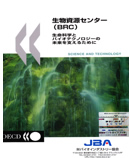
3. Promoting Access to and Benefit-sharing of Genetic Resources in Compliance with the CBD (2002 - Present)
3-1. JBA's involvement in the CBD-ABS process
The sovereign rights of states over genetic resources being recognized by the CBD, it became obligatory for users to obtain prior informed consent from countries providing the resources and to share the benefits arising from their use with the providing countries in a fair and equitable manner. Since 1993, METI and JBA have been steadily involved in implementing the CBD, as described in the preceding sections.
METI is a competent national authority on ABS in Japan. On behalf of METI, JBA has been implementing the CBD provisions on ABS and the Bonn Guidelines in order to help the private sector and the scientific community to continue to build a win-win relationship with other countries in compliance with the CBD. In this context, JBA has been participating in the meetings of the Ad Hoc Open-ended Working Group on Access and Benefit-sharing (WG-ABS) as well as those of the COP to support the government for discussion of ABS and other issues.
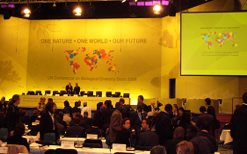
3-2. Dissemination of the CBD and the Bonn Guidelines for public education in Japan
The Bonn Guidelines (formally called the Bonn Guidelines on Access to Genetic Resources and Fair and Equitable Sharing of the Benefits Arising out of their Utilization) was adopted at COP6 held at The Hague, the Netherlands in April 2002. The Guidelines set forth the provisions of the CBD in more concrete terms. Immediately after their adoption, JBA started translating them into Japanese and completed it in September of the same year. For their dissemination, JBA organized more than 8 public seminars in major cities across Japan during the 2003-2004 periods.
These efforts helped to enhance the awareness of potential users of genetic resources, e.g., companies and researchers, about the CBD and the Bonn Guidelines. Those who use overseas genetic resources in research or business would run the risk of becoming involved in unexpected problems if they do not know the CBD. As well as striving to disseminate the CBD and the Bonn Guidelines to those stakeholders, JBA has widely transmitted information about international trends on the ABS issues under the CBD. Those from in industry, public research institutions and academia have attended these seminars, particularly with participants from a wide variety of industry sectors, including pharmaceuticals and healthcare, chemicals, cosmetics and toiletries, foods and health foods, and patent attorney's offices. On these occasions, JBA has expressed its view that building a realistic and effective system based on mutual understanding with the countries providing the genetic resources is the foundation for the long-term development of bioindustry.
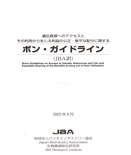
3-3. Development of 'Japan's ABS Guidelines for Users'
As the Bonn Guidelines became better understood in Japan, a number of users expressed their views that descriptions of the Bonn Guidelines were often too generic to be helpful for their specific and practical needs under the real-world conditions. They emphasized a need for user-specific and user-friendly guidelines on ABS. Taking these views into consideration, METI and JBA decided to develop user-specific guidelines on the basis of the Bonn Guidelines and the CBD. In consultation with experts from industry and academia, we started a project in 2004 to draft such guidelines, and completed 'the Guidelines on Access to Genetic Resources for Users in Japan' (Japan's ABS Guidelines for Users) and published them in April 2005.
The Japan's ABS Guidelines for Users were aimed to be a guide with practical utility and functionality for companies and research institutions accessing overseas genetic resources, by meeting the following conditions;
- To be of assistance in ensuring smooth access to genetic resources of providing countries, as well as in building win-win relationships that will allow both providers and users to benefit from the use of these resources through the appropriate, fair and equitable sharing of the benefits.
- To minimize the risk of getting involved in problems when seeking to use genetic resources for research and commercial purposes, while ensuring the flexibility of business.
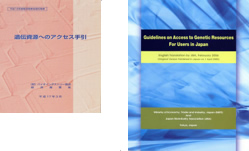
(Japanese version) (English version)
3-4. Specialized website on ABS: A Guide for Companies and Researchers (Reference 4)
Since 1993, JBA has been trying to gather information on domestic laws and regulatory measures relevant to ABS in various countries, especially those in Asia and Oceania. In order to widely disseminate this information for the benefit of those who use overseas genetic resources, JBA established a specialized website entitled Access to Bioresources and the Sharing of Benefits: An Information Guide for Companies in August 2003 (www.mabs.jp).
This site contains international information in Japanese relating to the CBD matters, country-specific information on the CBD-related measures (domestic laws, regulatory measures, etc.), and information on JBA activities for ABS (such as notifications of JBA's seminars and symposiums relating to the CBD-ABS as well as JBA's annual reports on METI-commissioned projects).
Furthermore, if users wish to obtain further information or seek JBA's advice, they can use this site to make direct contact with JBA's Help Desk (see the section below).
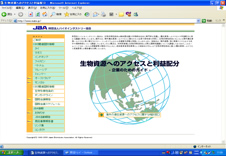
3-5. JBA's Help Desk on ABS; consultation service to support industry and academia for ABS
In April 2005, JBA created Help Desk, i.e., consultation service concerning ABS, providing advice to potential users of genetic resources. Based on the JBA's 15-year experiences in the CBD-related matters, JBA gives advice on CBD-ABS matters to those who have questions or problems, free of charge and on a confidential basis. Since 2005, JBA has handled more than 130 cases of such consultation, as of December 2008.
3-6. Other services for users of genetic resources
Bilateral workshops with CBD officials or experts of providing countries:
In order to promote development of partnerships between Japan's users of genetic resources and providing countries, METI and JBA have invited providing countries' officials (or experts) responsible for the CBD implementation, for information exchange at open-to-the public workshops or informal meetings in Japan. At such workshops, the invitees present information to the audience on their national policy, laws and regulatory systems relevant to ABS, to be followed by a Q&A session. In some cases, JBA staff members have visited CBD officials of providing countries in their home offices for information exchange. So far, we have held such bilateral workshops or meetings with the following countries; Australia, Brazil, Bhutan, Cambodia, China, India, Indonesia, Malaysia, Mongolia, Myanmar, Nepal, New Zealand, Singapore, Thailand and Vietnam.
International symposiums of stakeholders:
JBA alone, or jointly with other organizations such as United Nations University Institute of Advanced Studies (UNU-IAS in Yokohama, Japan), has annually been holding a series of international symposiums, workshops or roundtables to which ABS stakeholders are invited to speak on their own views, domestic situations or international trends concerning ABS, in order to share information with the audience and to discuss possible solutions to challenging issues.
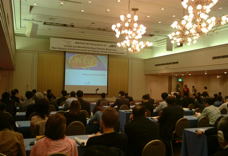
4. Concluding Remarks
Social and economic situations are different in different countries. Therefore, domestic needs are different, national policies are different, and, in turn, laws and regulatory systems are different in different countries. However, even under these circumstances, peoples from different countries can successfully and amicably collaborate if they identify a point of mutual interest. In our view, key to success is mutual understanding. Steps for win-win partnership development would be as follows:
- Understand each other's national situation.
- Set mutually agreed objectives, and jointly develop practical and effective procedure for collaboration based on the national laws and regulations of both countries, or based on the provisions of the CBD and the Bonn Guidelines if there are no relevant laws and regulations in place.
- Help each other to overcome risks, to achieve the objectives and to generate benefits.
- Share the benefits in a fair and equitable manner based on the agreed procedure.
References
- The Tokyo International Forum on Conservation and Sustainable Use of Tropical Bioresources, Results of the Bilateral Research Cooperation Projects Between Japan and Each of Thailand, Indonesia and Malaysia from 1993 to 1999, NEDO and JBA, November 9-10, 1998, Tokyo, Japan
- Biological Resource Centres: Underpinning the Future of Life Sciences and Biotechnology, OECD, Paris, 2001
- English version: http://www.mabs.jp/information/oshirase/pdf/iden_tebiki_e.pdf
- Japanese version: http://www.mabs.jp/information/oshirase/pdf/iden_tebiki.pdf
- http://www.mabs.jp/
* Contributors
- Seizo Sumida, Sachiko Tamate, Junko Watanabe, Yoshiyasu Yabusaki and Keiko Nozaki
